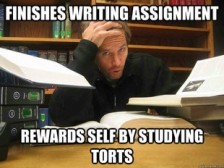
 On Tuesday, September 16, 2014, the Milwaukee Association for Women Lawyers (AWL) Foundation honored two Marquette University Law School students with scholarships.
On Tuesday, September 16, 2014, the Milwaukee Association for Women Lawyers (AWL) Foundation honored two Marquette University Law School students with scholarships.
Britteny LaFond, 3L (pictured at left), received the AWL Foundation scholarship. The AWL Foundation Scholarship is awarded to a woman who has exhibited service to others, diversity, compelling financial need, academic achievement, unique life experiences (such as overcoming obstacles to attend or continue law school), and advancement of women in the profession. LaFond grew up in a small Wisconsin town, never, in her words, seeing firsthand some of the difficulties that people face, like poverty and homelessness. Since being in law school, LaFond has spent many hours volunteeringat: the Milwaukee Justice Center’s Family Forms Assistance Clinic, the Domestic Violence Injunction Project, and the Marquette Volunteer Legal Clinic. LaFond completed a judicial internship with Judge Pocan in Milwaukee County and an internship with the Legal Aid Society (Guardian ad Litem division). She is also presently interning at the state public defender’s office with a year-long clinical placement. LaFond is an auction chair for the Public Interest Law Society, a member of the Pro Bono Society, as well as secretary of the Criminal Law Society.
Kelly Cavey (pictured at right) received the AWL Foundation’s Virginia A. Pomeroy scholarship. This scholarship honors the late Virginia A. Pomeroy, a former deputy state public defender and a past president of AWL. In addition to meeting the same criteria as for the AWL Foundation scholarship, the winner of this scholarship must also exhibit what the AWL Foundation calls “a special emphasis, through experience, employment, class work or clinical programs” in one of several particular areas: appellate practice, civil rights law, public interest law, public policy, public service, or service to the vulnerable or disadvantaged. Cavey, a part-time student now in her final year of law school, was for five years a juvenile corrections officer. She now works full-time with the state public defender’s office as support staff while she is finishing her law school. She is a member of the Marquette Law Review, the Pro Bono Society, AWL, and has often made the Dean’s List. Cavey was an intern at the U.S. Department of Justice this past summer (2014) and an intern with the U.S. Navy JAG Corps during the summer of 2012.
Congratulations to both women for outstanding service and for their representation of Marquette University Law School.
 It’s a gray, rainy fall-like Friday. The fall is a wonderful season, especially in Wisconsin. But the fall, for law students, brings with it some added stressors: negotiating the fall interview season for 2Ls, keeping up with the increased workload in classes, squeezing in pro bono hours, writing appellate briefs or memos, all while trying to still have a life outside of law school. These stressors can feel overwhelming, especially to the 1Ls who are, as of yet, unfamiliar with the full rhythm of law school.
It’s a gray, rainy fall-like Friday. The fall is a wonderful season, especially in Wisconsin. But the fall, for law students, brings with it some added stressors: negotiating the fall interview season for 2Ls, keeping up with the increased workload in classes, squeezing in pro bono hours, writing appellate briefs or memos, all while trying to still have a life outside of law school. These stressors can feel overwhelming, especially to the 1Ls who are, as of yet, unfamiliar with the full rhythm of law school.


